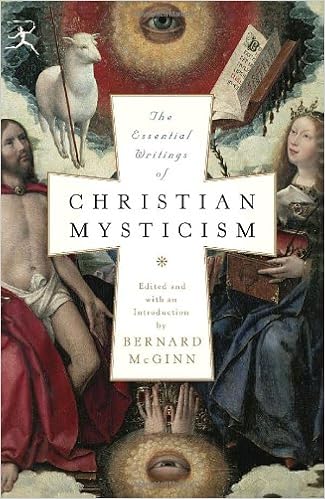Bernard McGinn on the future of mysticism

Professor Bernard McGinn of the University of Chicago is the leading historian of Christian mysticism. He's written five of a projected seven volumes of his history of mysticism, called The Presence of God, which have traced the evolution of Christian mysticism from Jesus to the 1550s. He's now working on the sixth volume, exploring mysticism during the Reformation and Counter-Reformation. I contacted him because I was impatient to hear his views about what happened to mysticism in the modern era. Did it lose its central place because of the Reformation and Dissolution of the Monasteries? Did the rise of rationalism destroy it? Was it kept alive outside of monasteries by 17th century poets? Is it taking new forms in the New Age era, such as nature mysticism or sexual mysticism? Let's find out!
Has contemplation become less central to Western Christianity?
Well, it certainly has a less public resonance than it did in the medieval period and even afterwards in Early Modernity. Fifty-sixty years ago, the answer would have been a strong “yes,” but the interest in Eastern religions and their meditative-contemplative traditions, beginning in the 1950s, has made a difference. Many Christians, lay and clerical (how many I don’t know), engage in contemplative practices today.
Did the Reformation and Counter-Reformation lead to a greater suspicion of mysticism?
Many Reformers, especially in the Calvinist tradition, were suspicious of mysticism. Luther was not a mystic, but praised some mystics and used their ideas. There is certainly a tradition of Protestant mysticism, especially in Lutheranism. Mysticism remained central, if at times controversial, in Roman Catholicism down to the Quietist controversy (ca. 1675-1700), when it was condemned and pushed to the margins.
What effect did the dissolution of the monasteries have on the contemplative tradition?
Remember there are two dissolutions: England in the sixteenth century and continental Europe during and after the Napoleonic Wars. In England, there was certainly an effect, because the Carthusian houses were centers for contemplation and the publication of mystical texts.
To what extent would you say that, in England, contemplative poetry (Donne, Traherne, Herbert etc) took up some of the role of contemplation for the laity, which used to be provided by devotional books created by monasteries?
I believe it had a strong effect in keeping mysticism alive in new contexts. As a matter of fact, I’m now writing a chapter on this for vol. 6 of my history of mysticism.
My own initial research suggests Protestant meditation endured and found new forms - but it seems the apophatic tradition of mysticism (which emphasizes the incomprehensibility of God) in particular was lost. Is that true?
I am learning more about this, but my ideas are still not firm. Louis Martz spoke about the 'poetry of meditation' in the 16th and 17th century [ie that poets like Donne and Herbert adopted and kept alive monastic contemplative practices], and I think this may be correct. Apophaticism remained strong in 16th century Spain and in 17th century France, but I’m inclined to think it was diminished (not lost) in England.
Mysticism was visual / visionary as well as verbal in pre-Reformation culture. Considering the Protestant revolt aganst iconography and the triumph of the Biblical Word, did Protestant meditation become less visual / visionary and more verbal?
I would not over-generalize here. Late medieval mysticism had many visual aspects (see J. Hamburger et al.), but some Catholic and Protestant mystics in the 16th-17th centuries made use of visual materials, e.g., emblems and emblem books (like Jacob Boehme).
As mainstream christianity (Protestant and Catholic) became more rationalist and anti-enthusiast in the 17th century, would you say it lost the positive idea of ecstatic states beyond rationalism?
Definitely. The Enlightenment thinkers were very anti-ecstatic; but the Romantics were not.
You’ve written that mysticism is always changing with new layers appear over older layers - and that one new layer may be a new attitude to sexuality. Could you say a bit more about that? Where do you see this new layer appearing?
Yes, layering is one of the ways I use to understand the variety of the history of mysticism. Vol. 3 of my history tries to lay out a shift from a largely biblical eroticism based on the Song of Songs to a more a more personal, ecstatic, excessive eroticism beginning with Richard of St. Victor at the end of the 12th-century and developed in various ways, mostly (not solely) by female mystics, in the late Middle Ages. I’m afraid that’s all I can say on this complicated issue here.
What about attitudes to nature - do you see signs of the emergence of a more nature-focused mysticism or spirituality?
Nature mysticism has always been present in the West. See, for example, some of the Hermetic literature, Eriugena, some 12th century figures, Francis of Assisi, Luis de Leon, etc. I think it may be correct to see “nature mysticism,” which means different things to different folk, growing in the 19th and 20th centuries (e.g., Richard Jeffries). The current ecological awareness seems to have encouraged new forms of nature mysticism — all to the good.
To what extent do you think western Protestant christianity is overly suspicious and condemnatory of contemplation today? And where could interested lay people go to try and study / practice contemplation today?
It’s hard to generalize. Are the Evangelicals much interested in contemplation? I doubt it, but I have met Evangelicals who are. In the mainline Protestant denominations I sense a growing interest in contemplation and mysticism, but, not being a religious sociologist (nor a Protestant), my evidence is circumstantial.


